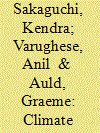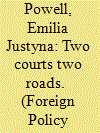|
|
|
Sort Order |
|
|
|
Items / Page
|
|
|
|
|
|
|
| Srl | Item |
| 1 |
ID:
157538


|
|
|
|
|
| Summary/Abstract |
Global climate change has been connected to myriad societal and environmental consequences, including the potential for a rise in violent conflict. To advance understanding of violent conflict as a threat, we undertake a systematic review of peer-reviewed, empirical analyses examining the potential links between climate change and violent conflict. The review reveals three key findings. First, the reviewed studies offer mixed and varied evidence for links between climate change and violence. A majority of studies find evidence that climate variables are associated with higher levels of violent conflict. However, this general pattern masks many subtleties and countertrends that complicate moving to a simple conclusion that the link between climate change and violence is robust. Second, most studies hypothesize an indirect relationship between climate change and violent conflict mediated by and/or interacting with a complex set of intervening variables; however, these causal pathways have only weak empirical support. Third, the empirical basis of the literature has important limitations. Study findings appear to be sensitive to differing methodological choices, making systematic assessments inconclusive.
|
|
|
|
|
|
|
|
|
|
|
|
|
|
|
|
| 2 |
ID:
133183


|
|
|
|
|
| Publication |
2014.
|
| Summary/Abstract |
This paper decomposes the growth of China's export into three parts: growth in extensive margin, increased quantity and increased prices; we perform a series of empirical analyses using China's export data at the HS-6 digit level to analyze the characteristics of China's export growth. China's export growth depends more and more on price increases, less and less on quantity expansion. Compared with the rest of world, China's export price is in the process of improving, not at an increasing speed but at a declining pace. China's export performance is better than the rest of the world after the financial crisis and in 2008-2010. This reflects a strategy of lowering price and promoting sales in 2009 when facing a slump in export markets; and resuming price increases and increasing sales moderately in reaction to improving export conditions in 2010.
|
|
|
|
|
|
|
|
|
|
|
|
|
|
|
|
| 3 |
ID:
099759


|
|
|
|
|
| Summary/Abstract |
Some studies find that democratic states are more amenable to third party forms of conflict management, while other studies indicate that democracies are able to resolve contentious issues on their own through bilateral negotiations. Using data from the Issue Correlates of War (ICOW) Project, the authors investigate peaceful and militarized conflict management strategies that democratic states employ to resolve contentious issues. Theoretically, the authors focus on how militarized conflict history, relative capabilities, and issue salience influence the tools of conflict management employed by democratic states. Empirical analyses suggest that democratic dyads employ bilateral negotiations more often to resolve contentious issues when the issue has not been militarized previously, when the issue is more salient, and when democratic states face equal adversaries. Democratic dyads seek out nonbinding third party settlement more frequently in situations of power preponderance than nondemocratic dyads, although binding forms of third party settlement occur most often in relatively equal democratic dyads. When it comes to the use of force, democratic states are much less likely than their authoritarian counterparts to militarize an issue claim when little or no armed conflict characterizes the relationship. However, democratic leaders show a willingness to confront force with force. After one militarized dispute, democratic states are no different in their conflict propensity than autocratic states.
|
|
|
|
|
|
|
|
|
|
|
|
|
|
|
|
| 4 |
ID:
124600


|
|
|
|
|
| Publication |
2013.
|
| Summary/Abstract |
The International Court of Justice (ICJ) and the International Criminal Court (ICC) constitute two prominent international courts. However, there exists considerable variation in states' support for these two institutions. The Rome Statute, which recognizes the jurisdiction of the ICC has been ratified by over half the states in the world; only a third of states accept the compulsory jurisdiction of the ICJ. How are we to understand this variation in state support for these two courts? I argue that there is an inherent link between the quality of a state's domestic legal system (rule of law) and perceived legitimacy of an international court. Empirical analyses of states' support for the ICJ and the ICC show that rule-of-law states lend support to the ICC, a court perceived by the international community as legitimate. Alleged bias of the ICJ has, on the other hand, substantially weakened support for this court among rule-of-law states.
|
|
|
|
|
|
|
|
|
|
|
|
|
|
|
|
|
|
|
|
|